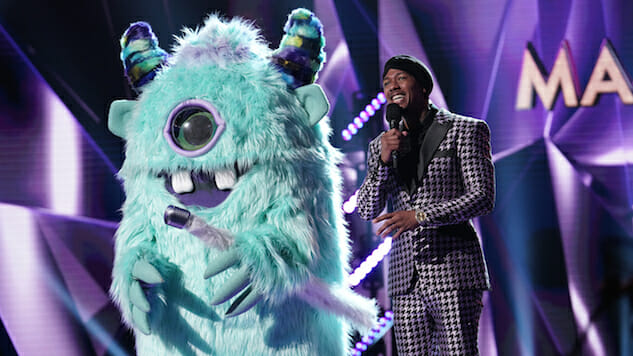The Masked Singer, Temptation Island, and the Return of Early 2000s Reality TV
Photo: Michael Becker/FOX
“I can’t figure it out.”— Jenny McCarthy, The Masked Singer
One of the first breakout TV series of 2019 is FOX’s The Masked Singer, a reality show based on South Korea’s The King of Mask Singer. While it claims to feature “your favorite celebrity” performing in an elaborate costume, you’re not getting much higher than B-minus list celebrities with The Masked Singer. That’s simply the case for all “celebreality” shows, such as The Celebrity Apprentice, Celebrity Big Brother, The Challenge: Champs vs. Stars, and even the most successful of the bunch, Dancing With The Stars. But part of The Masked Singer’s weird, annoying charm is seeing its (also B-minus list) celebrity panel suggesting Hugh Jackman, Lady Gaga, and Justin Timberlake.
It’s 2019: No one believes this will happen.
One claim The Masked Singer can honestly make, though, is that it is “the wildest guessing game on TV,” with elaborate, nightmare-fuel costumes used to “hide” the identities of its competitors. (“Hide” is in air quotes here because The Masked Singer also includes video packages based on very specific clues—which the panelists tend to ignore in favor of non-clues—and uses a form of voice modulation that can’t cover up certain celebrities’ recognizable cadences—such as eliminated competitors Tommy Chong and Terry Bradshaw.)
The fun is that savvy viewers are able to pick up these nuances in the first two episodes, when all 12 initial competitors are introduced, while the panel—which consists of singer-songwriter Nicole Scherzinger, actor-comedian Ken Jeong, singer-songwriter Robin Thicke, and “pop culture guru” Jenny McCarthy, whose guesses each week suggest that The Masked Singer has a different working definition of “guru”—still has trouble grasping the niceties going into the fourth. As guest panelist Joel McHale made clear in the third episode with his logic, his steadfast attention, and his frequent notes about the series’ bizarreness, the panel—especially McCarthy—is so glib that The Masked Singer seems to exist solely to be featured as a Saturday Night Live sketch. Heidi Gardner probably has a killer Jenny McCarthy impression at the ready.
Every conversation I’ve had with people about The Masked Singer, whether they’ve seen it or not, is filled with exactly the kind of awe and confusion that makes it so watchable. Actual pop culture gurus—I hate that I keep using the phrase, but The Masked Singer struck first—maintain it’s not a matter of solving the mystery, because they’ve already done that. (Here are my thoughts on the Bee and the Monster.) And every level of Masked Sleuther can agree that the panel is the worst part of the series. Even so, The Masked Singer is the type of reality TV that brings people together in a way you don’t see very often in the age of “peak TV,” a strange global phenomenon that doesn’t make you feel like garbage for enjoying it: All things considered, it’s pretty wholesome.
-

-

-

-

- Curated Home Page Articles By Test Admin October 21, 2025 | 3:10pm
-

- Curated Home Page Articles By Test Admin October 21, 2025 | 2:57pm
- Urls By Test Admin October 21, 2025 | 2:57pm
- Curated Home Page Articles By Test Admin October 21, 2025 | 2:55pm
-

-

-

-

-

-

-

-

-

-

-

-

-

-

-

-

-

-

-

-

-

-

-

-

-

-

-

-

-

-

-




































